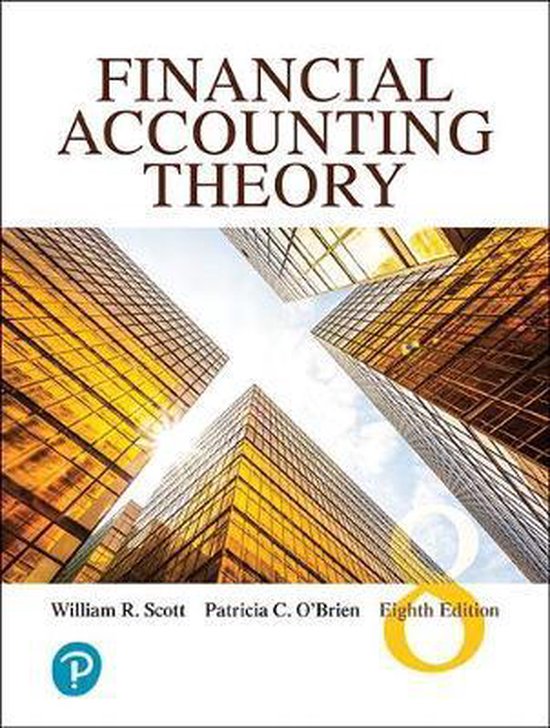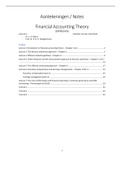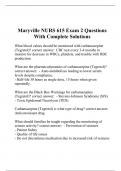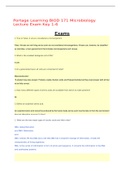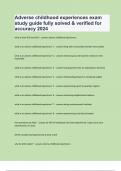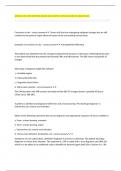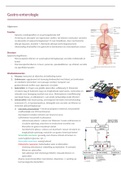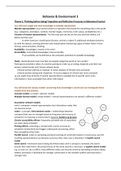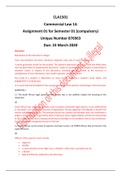Aantekeningen / Notes
-
Financial Accounting Theory
(EBM863A05)
Lecturers: Semester 2A year 2022/2023
- dr. T. A. Marra
- Prof. dr. R. B. H. Hooghiemstra
Index
Lecture 1 Introduction to financial accounting theory – Chapter 1 & 2 ................................................. 2
Lecture 2: The decision usefulness approach – Chapter 3 ...................................................................... 5
Lecture 3: Efficient market hypothesis – Chapter 4 ................................................................................ 9
Lecture 4: Value relevance and the measurement approach to decision usefulness – Chapter 5, 6 & 7
............................................................................................................................................................... 13
Lecture 5: The efficient contracting approach – Chapter 8 .................................................................. 17
Lecture 6: Executive compensation and earnings managements – Chapter 10 & 11 .......................... 23
Executive compensation (part I).................................................................................................... 23
Earnings management (part II) ...................................................................................................... 26
Lecture 7: The role of information and financial reporting in corporate governance and debt
contracting – Armstrong et al.(2010) .................................................................................................... 29
Tutorial 1 ............................................................................................................................................... 34
Tutorial 2 ............................................................................................................................................... 34
Tutorial 3 ............................................................................................................................................... 35
1
,Lecture 1 Introduction to financial accounting theory – Chapter 1 & 2
Financial Accounting Theory
Definition: Construction of logical reasonings to increase our understanding of accounting
practices and to help quiding future developments therein
History of accounting science
- “Mainstream” accounting research (practices)
o Stock market crash in the U.S. in 1929
o Securities (exchange) Act (1933, 1934) onstaan na crash op aandelenmarkt
o Securities Exchange Commission (SEC) Toezicht op markten
o Lack of regulation (private sector, FASB)
- Research those days
o Focus: true income, conceptual framework
o Income statement versus balance sheet orientation
Focus before crash was on balance sheet, nowadays more on income
statement or cash flow
1960s
- Changes in accounting research
o New theories
Rational decision making under uncertainty
Efficient securities markets
Information economics
- Shift in focus
o Decision usefulness of financial accounting information Wat is bruikbaar?
Early 2000s
- Internet bubble
o Securities market crash in the hi-tech industry
- New revenue recognition standards
o Too early recognition of revenues
- Accounting for special financing arrangements Financieringsconstructies
o SPE’s (special purpose entity’s)
- Corporate governance regulation
o Sarbenes-Oxley Act, governance codes
2007-2008
- Financial crisis
o Global crisis due to non-transparency and fraud in the asset backed securities market
- Accounting for special financing constructions
o Accounting for financial leverage, off-balance sheet leverage
- Fair value accounting for financial instruments
o Fair or market value versus value-in use
Where are we now?
- Primary theory in text book: information economics
o Uneven distribution of information (information asymmetry) informatieverdeling
o Adverse selection (koper heeft meer informatie; verzekeringen)
o Moral hazard (Moreel risico; Hoe goed ga je om met dat wat verzekert is
- Financial accounting can help:
o Investors to assess firm performance
o Boards to assess management performance
2
,Information asymmetry problems
- Adverse selection
o A situation in which sellers only sell the product when it is favourable to them
E.g., selling overvalued shares
o Or the highest cost buyer end up buying a particular product
E.g., life insurance
- Moral hazard
o “any situation in which one person makes the decision about how much risk to take,
while someone else bears the cost if things go badly.” (Paul Krugman, 2009)
o E.g., holiday insurance, bank bailouts, manager shirking
Fundamental problem
- Two equally important functions
o Inform investors Totale presentatie van de onderneming
o Inform owners (Boards of directors) Deel wat de manager kan beïnvloeden
- Fundamental financial accounting problem
o Solve adverse selection and moral hazard problem
o Relevance versus reliability
o Sensitivity versus precision
Sensitive is fast information, precision is slow.
We can not tackle them in one framework
Scott (2020, p.24):
“the best measure of net income to solve the adverse selection problem is not the best measure of
net income to solve the moral hazard problem.”
Organization of Scott (2020)
Accounting under ideal circumstances
Statement:
- Under ideal circumstances the present value model (DCF-model) provides the utmost in
relevant and reliable financial accounting information. (in ideal condition possible, in real
not)
3
, Ideal circumstances
What is relevant information?
- Information about future economic prospects
What is reliable information?
- Information that “faithfully represents what it is intended to represent”
o It is the difference between betrouwbaar en getrouw in dutch
- Complete information and without (un)intentional bias
What are ideal circumstances?
- All states are known, state realisation public knowledge objective state probabilities, given
interest rate
DCF-model under certainly openings balance sheet
Present value of company with
- No debt
- One asset
- Asset’s life is 2 year income statement year 1
- Cash flow of 150 en of each year
- Interest rate 10%
-
Remarks Balance sheet end of year 1
- Book value = present value = market
value
o PV=MV due to arbitrage
- “Accretion of discount”
(disconteringsaanwas)
o Net income = PV0(SE) x discount
rate
- Dividend payment is irrelevant
- Income statement is redundant Alternative presentation
- Financial reports fully reliable and
relevant under certainly conditions
DCF-model under uncertainy
Present value of company with opening balance sheet
- No debt
- One asset
- Life of 2 year
- End of each year two possible states Income statement year 1 (recession)
- Cash flow either 100 or 200
Alternative presentation Balance sheet end Year 1
Abnormal earnings is the difference between expected and the actual cash flow.
4
-
Financial Accounting Theory
(EBM863A05)
Lecturers: Semester 2A year 2022/2023
- dr. T. A. Marra
- Prof. dr. R. B. H. Hooghiemstra
Index
Lecture 1 Introduction to financial accounting theory – Chapter 1 & 2 ................................................. 2
Lecture 2: The decision usefulness approach – Chapter 3 ...................................................................... 5
Lecture 3: Efficient market hypothesis – Chapter 4 ................................................................................ 9
Lecture 4: Value relevance and the measurement approach to decision usefulness – Chapter 5, 6 & 7
............................................................................................................................................................... 13
Lecture 5: The efficient contracting approach – Chapter 8 .................................................................. 17
Lecture 6: Executive compensation and earnings managements – Chapter 10 & 11 .......................... 23
Executive compensation (part I).................................................................................................... 23
Earnings management (part II) ...................................................................................................... 26
Lecture 7: The role of information and financial reporting in corporate governance and debt
contracting – Armstrong et al.(2010) .................................................................................................... 29
Tutorial 1 ............................................................................................................................................... 34
Tutorial 2 ............................................................................................................................................... 34
Tutorial 3 ............................................................................................................................................... 35
1
,Lecture 1 Introduction to financial accounting theory – Chapter 1 & 2
Financial Accounting Theory
Definition: Construction of logical reasonings to increase our understanding of accounting
practices and to help quiding future developments therein
History of accounting science
- “Mainstream” accounting research (practices)
o Stock market crash in the U.S. in 1929
o Securities (exchange) Act (1933, 1934) onstaan na crash op aandelenmarkt
o Securities Exchange Commission (SEC) Toezicht op markten
o Lack of regulation (private sector, FASB)
- Research those days
o Focus: true income, conceptual framework
o Income statement versus balance sheet orientation
Focus before crash was on balance sheet, nowadays more on income
statement or cash flow
1960s
- Changes in accounting research
o New theories
Rational decision making under uncertainty
Efficient securities markets
Information economics
- Shift in focus
o Decision usefulness of financial accounting information Wat is bruikbaar?
Early 2000s
- Internet bubble
o Securities market crash in the hi-tech industry
- New revenue recognition standards
o Too early recognition of revenues
- Accounting for special financing arrangements Financieringsconstructies
o SPE’s (special purpose entity’s)
- Corporate governance regulation
o Sarbenes-Oxley Act, governance codes
2007-2008
- Financial crisis
o Global crisis due to non-transparency and fraud in the asset backed securities market
- Accounting for special financing constructions
o Accounting for financial leverage, off-balance sheet leverage
- Fair value accounting for financial instruments
o Fair or market value versus value-in use
Where are we now?
- Primary theory in text book: information economics
o Uneven distribution of information (information asymmetry) informatieverdeling
o Adverse selection (koper heeft meer informatie; verzekeringen)
o Moral hazard (Moreel risico; Hoe goed ga je om met dat wat verzekert is
- Financial accounting can help:
o Investors to assess firm performance
o Boards to assess management performance
2
,Information asymmetry problems
- Adverse selection
o A situation in which sellers only sell the product when it is favourable to them
E.g., selling overvalued shares
o Or the highest cost buyer end up buying a particular product
E.g., life insurance
- Moral hazard
o “any situation in which one person makes the decision about how much risk to take,
while someone else bears the cost if things go badly.” (Paul Krugman, 2009)
o E.g., holiday insurance, bank bailouts, manager shirking
Fundamental problem
- Two equally important functions
o Inform investors Totale presentatie van de onderneming
o Inform owners (Boards of directors) Deel wat de manager kan beïnvloeden
- Fundamental financial accounting problem
o Solve adverse selection and moral hazard problem
o Relevance versus reliability
o Sensitivity versus precision
Sensitive is fast information, precision is slow.
We can not tackle them in one framework
Scott (2020, p.24):
“the best measure of net income to solve the adverse selection problem is not the best measure of
net income to solve the moral hazard problem.”
Organization of Scott (2020)
Accounting under ideal circumstances
Statement:
- Under ideal circumstances the present value model (DCF-model) provides the utmost in
relevant and reliable financial accounting information. (in ideal condition possible, in real
not)
3
, Ideal circumstances
What is relevant information?
- Information about future economic prospects
What is reliable information?
- Information that “faithfully represents what it is intended to represent”
o It is the difference between betrouwbaar en getrouw in dutch
- Complete information and without (un)intentional bias
What are ideal circumstances?
- All states are known, state realisation public knowledge objective state probabilities, given
interest rate
DCF-model under certainly openings balance sheet
Present value of company with
- No debt
- One asset
- Asset’s life is 2 year income statement year 1
- Cash flow of 150 en of each year
- Interest rate 10%
-
Remarks Balance sheet end of year 1
- Book value = present value = market
value
o PV=MV due to arbitrage
- “Accretion of discount”
(disconteringsaanwas)
o Net income = PV0(SE) x discount
rate
- Dividend payment is irrelevant
- Income statement is redundant Alternative presentation
- Financial reports fully reliable and
relevant under certainly conditions
DCF-model under uncertainy
Present value of company with opening balance sheet
- No debt
- One asset
- Life of 2 year
- End of each year two possible states Income statement year 1 (recession)
- Cash flow either 100 or 200
Alternative presentation Balance sheet end Year 1
Abnormal earnings is the difference between expected and the actual cash flow.
4

